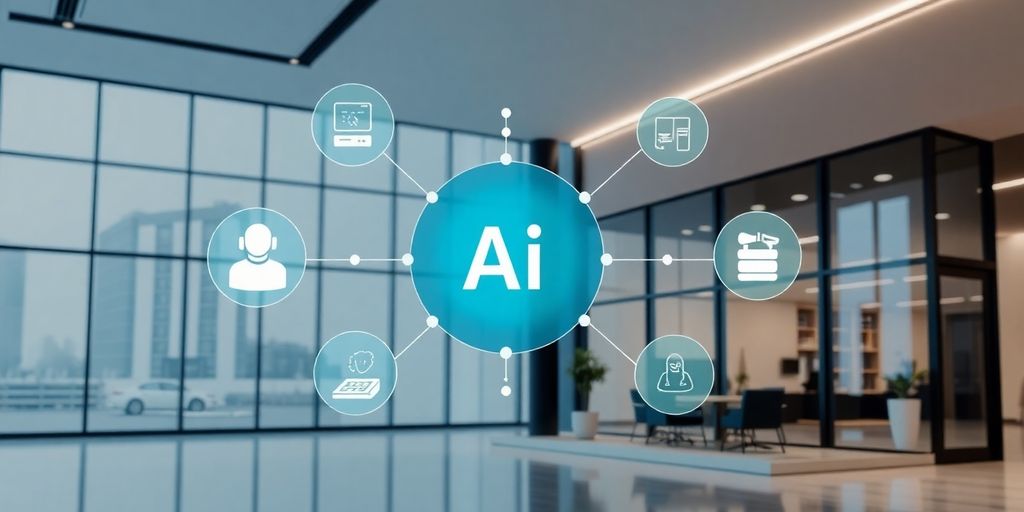Running a property management company means juggling a lot of tasks, and sometimes, the front desk can get pretty swamped. You know, with calls, inquiries, and just keeping things moving. It's a lot. But what if there was a way to make all that easier, to free up your staff and make tenants happier? That's where an ai front desk for property management company comes in. It's not just about answering phones; it's about changing how you do business for the better. Let's look at how this tech can really help your company succeed.

The property management world is changing, and fast. Gone are the days when a simple ledger and a friendly face at the front desk were enough. Today's tenants and guests expect more, and frankly, they expect it now. This is where the AI front desk comes in, not as a replacement for human interaction, but as a powerful tool to make everything run smoother. Think of it as giving your business a super-powered assistant that never sleeps.
AI isn't just a buzzword; it's a practical solution for many of the headaches property managers face daily. From answering the same questions over and over to keeping track of maintenance requests, AI can take on a lot of the repetitive work. This frees up your human staff to handle more complex issues or focus on building better relationships with residents. It’s about working smarter, not just harder.
Traditionally, the front desk was the central hub for communication and administration. With AI, this role is expanding. The AI front desk can handle initial inquiries, schedule appointments, and even guide new tenants through the move-in process. It acts as the first point of contact, providing instant information and directing more complex matters to the right person. This means fewer dropped calls and quicker responses for everyone involved.
An AI receptionist can do a lot more than just pick up the phone. These systems can be programmed to understand and respond to a wide range of queries, manage booking requests, send out reminders, and collect feedback. They learn over time, becoming more efficient and personalized with each interaction. Imagine an AI that can greet a visitor, check their appointment, and notify the person they're meeting, all without human intervention. That's the power we're talking about.
Switching to an AI front desk isn't just about keeping up with technology; it's about making real, tangible improvements to how your property management company operates and how people interact with it. The right AI system can fundamentally change your day-to-day, making things smoother for everyone involved.
Think about the last time you had a great experience with a service. Chances are, it was easy, fast, and felt like they knew what you needed before you even asked. An AI front desk aims to do just that for your tenants and guests. It means no more waiting on hold to ask a simple question or trying to find the right person to talk to about a maintenance issue. AI can handle a lot of these common interactions instantly, 24/7. This means quicker responses to inquiries, easier booking of appointments, and a generally less frustrating experience for people living in or visiting your properties. It’s about making them feel looked after, right from the first point of contact.
Let's be honest, a lot of time at a traditional front desk gets eaten up by repetitive tasks. Answering the same questions over and over, scheduling viewings, sending out standard information – it all adds up. AI can take over these duties, freeing up your human staff to focus on more complex issues or tasks that really need a personal touch. This automation doesn't just make your team more efficient; it can also lead to significant cost savings. Fewer hours spent on manual tasks mean lower labor costs, and better management of resources can prevent waste. It’s a win-win: your team works smarter, and your budget breathes a little easier.
Your tenants and guests don't operate on a 9-to-5 schedule, and neither should your front desk support. With an AI front desk, help is always available. Whether it's a late-night question about a building amenity or an early-morning request to report a leaky faucet, the AI is there to assist. This constant availability means no more missed opportunities or frustrated residents waiting until business hours. It provides immediate responses and can even initiate action, like logging a maintenance ticket, without delay. This level of consistent support builds trust and satisfaction, showing that you're always ready to help, no matter the time.

An AI front desk does more than just answer phones; it's a powerful tool that can really change how your property management company operates day-to-day. Think of it as having a super-efficient assistant who never sleeps and can handle a lot of the repetitive stuff that eats up your team's time.
This is probably the most obvious benefit. When someone calls or sends a message with a question about a property, the AI can figure out what they need and send them to the right place. It can answer common questions about availability, rent prices, or amenities instantly. If it's a more complex issue, like a specific maintenance request or a lease signing question, it can route the inquiry to the correct department or person, making sure no one has to wait around forever for an answer. This immediate, accurate routing means fewer missed opportunities and happier potential renters.
Setting up property viewings or maintenance appointments can be a real headache. An AI front desk can connect directly to your team's calendars and available slots. Prospective tenants can book a viewing time that works for them without you having to play phone tag. Similarly, residents can schedule maintenance requests at their convenience. The AI handles the back-and-forth, confirms the appointments, and even sends reminders, cutting down on no-shows and freeing up your leasing agents and maintenance coordinators.
Getting new tenants settled in and managing move-outs can involve a lot of paperwork and communication. The AI can help streamline these processes. For onboarding, it can guide new residents through initial steps, provide digital lease agreements, answer questions about move-in procedures, and even help set up utility connections. When a tenant moves out, the AI can manage the notice period, schedule final inspections, and process security deposit returns. It makes these transitions smoother for everyone involved, reducing administrative burden and improving the overall resident experience.

Let's talk about making your property management business run smoother. You know, all those little tasks that eat up your day? AI can really help with that. It's not about replacing people, but about giving them tools to do their jobs better and faster.
Think about all the paperwork and repetitive stuff that comes with managing properties. AI can take over a lot of that. We're talking about things like sending out rent reminders, processing applications, or even just answering basic questions tenants might have. This frees up your staff to focus on more important things, like building relationships with tenants or dealing with complex issues. It’s like having an extra pair of hands that never gets tired.
Dealing with maintenance requests can be a headache. Tenants report an issue, someone has to log it, find a vendor, schedule it, and then follow up. AI can streamline this whole process. It can automatically log requests, categorize them based on urgency, and even suggest the best vendor for the job based on past performance and availability. Some systems can even predict when a piece of equipment might fail, so you can fix it before it breaks. That means fewer emergency calls and happier tenants.
Keeping everyone in the loop can be tough, especially if you manage multiple buildings or a large portfolio. AI can help manage communications more effectively. It can send out mass announcements about building maintenance or community events, tailor messages to specific groups of tenants, and provide instant responses to common questions through chatbots. This consistent and timely communication helps build a stronger sense of community and reduces the chances of miscommunication or missed information.
Think of your AI front desk not just as a receptionist, but as a data-gathering powerhouse. It's constantly collecting information from every interaction, and if you know how to look at it, this data can really help you make smarter choices for your property management business. It’s like having a crystal ball, but instead of magic, it’s just good old data analysis.
Your AI can look at past booking patterns, local events, and even seasonal changes to give you a heads-up on when you'll be busy and when things might be a bit slower. This means you can plan staffing better, maybe run a special offer during a predicted lull, or make sure you have enough supplies for a busy period. It helps you stop guessing and start planning with more confidence.
Ever wonder why some tenants renew their leases and others don't? Or what amenities they actually use the most? The AI can track this. It learns what tenants like, what they ask for, and how they interact with your services. This information is gold for figuring out how to keep tenants happy and reduce turnover. You can tailor your services, improve communication, and even anticipate needs before they're even voiced.
This is where things get really interesting. By analyzing booking data, market demand, and even competitor pricing (if you feed that in), your AI can suggest optimal rental rates. It can also identify opportunities for upsells, like offering a premium unit or an extra service to a tenant who is likely to accept. This smart approach to pricing and services can significantly boost your revenue without alienating tenants. It’s about making every unit and every service work harder for you.
Getting an AI front desk up and running for your property management company involves a few key steps. It’s not just about plugging something in and hoping for the best. You really need to think about what you want it to do and how it fits with what you’re already doing.
First off, you’ve got to pick the right tool for the job. There are a bunch of AI receptionist platforms out there, and they all do slightly different things. Some are better at just answering calls and taking messages, while others can handle more complex tasks like scheduling showings or answering detailed questions about a property. You’ll want to look at:
Once you’ve picked a platform, you can’t just let it run wild. You need to make it sound like your company. This means training it on your specific language, your policies, and even your company’s personality. Do you want it to be super formal, or more friendly and casual? You can often set up custom greetings, choose voice options, and define how it should respond to common questions. It’s about making sure that when someone interacts with the AI, they still feel like they’re talking to your company, not some generic robot.
This is where the real magic happens, or where things can get tricky if you don’t plan it right. Your AI front desk needs to talk to your other systems. For example, when the AI schedules a showing, it should automatically update your leasing calendar. If a tenant submits a maintenance request through the AI, it should go straight into your work order system.
Making sure these systems can talk to each other smoothly is super important. If they don’t, you’ll end up with manual data entry, which defeats the purpose of automation.
Think about what data needs to flow between systems and how that will happen. This might involve APIs or specific connectors that the AI platform offers. Getting this right means your AI isn’t just an add-on; it’s a core part of your operational flow.
Bringing an AI front desk into your property management company is a big step, and like any new technology, it comes with its own set of hurdles. It’s not just about plugging it in and expecting magic. You’ve got to think about how it’s going to work with what you already have and how your team will react.
This is a huge one. When you’re dealing with tenant information, leases, and personal contact details, keeping that data locked down is non-negotiable. You need to be absolutely sure that the AI platform you choose has top-notch security measures in place. Think encryption, secure data storage, and clear policies on who can access what. It’s about building trust with your tenants – they need to know their information is safe.
Getting everyone on board can be tricky. Some team members might worry about their jobs, while others might just be resistant to change. It’s important to show them how the AI front desk isn't there to replace them, but to help them. It can take over the repetitive tasks, freeing them up for more complex or engaging work. Think of it as a tool that makes their jobs easier and allows them to focus on providing better service.
Your property management software, your CRM, your maintenance tracking system – they all need to talk to each other. Making sure the AI front desk can connect smoothly with these existing systems is key. If it’s a clunky integration, it can create more problems than it solves. Look for platforms that offer robust integration options or have a good track record of working with common property management software. A poorly integrated system can lead to data silos and inefficient workflows, which is the opposite of what you're trying to achieve.
The goal is to make the AI a helpful assistant, not a barrier. Clear communication, proper training, and a focus on how it benefits everyone are the best ways to smooth out these adoption bumps.
Getting your team ready for a new AI front desk is a big deal. It’s not just about plugging in new tech; it’s about making sure everyone on your staff feels comfortable and knows how to work with it. Think of it like introducing a new team member, but this one happens to be a computer program.
First off, you need to explain why you’re bringing in an AI receptionist. It’s important to stress that this isn't about replacing people, but about helping them. The AI can handle the repetitive stuff, like answering basic questions or scheduling initial viewings, freeing up your human team for more complex issues that need a personal touch. When people understand that the AI is there to support them and make their jobs easier, they’re much more likely to get on board. You could even show them examples of how it takes the pressure off during busy periods.
Once everyone understands the 'why,' they need to know the 'how.' Training is key. This means showing your team exactly what the AI can do, what it can't, and how to step in when needed. Think about:
Ongoing support is just as vital. Having a go-to person or a clear channel for questions will make a huge difference. People will have questions as they start using the system, and being able to get quick answers prevents frustration.
Finally, you’ll need to figure out how the AI fits into your day-to-day operations. This means updating existing workflows or creating new ones. For example:
It’s about finding that sweet spot where the AI and your human team work together smoothly. This might involve some trial and error, so be prepared to adjust as you go. The goal is to create a system that’s more efficient and provides a better experience for everyone involved, from your staff to your tenants.
So, you've brought in an AI front desk, and things are running smoother. But how do you actually know if it was worth the money? That's where measuring the return on investment, or ROI, comes in. It’s not just about feeling like things are better; it’s about seeing the numbers back it up.
Before you even think about the AI, you need a baseline. What were your numbers like before? You'll want to look at things like how many calls you were getting, how long it took to answer them, and how many people hung up before talking to someone. After the AI is in place, you track these same things. Did the average wait time go down? Are fewer people abandoning calls? You should also track how many appointments are being booked and how many maintenance requests are being handled. These are the basic building blocks for understanding the impact.
This is usually the most straightforward part. Think about the cost of a human receptionist – salary, benefits, training, office space, all that. Now, compare that to the cost of your AI system. You'll likely see savings in areas like reduced staffing needs, fewer errors that cost money to fix, and less time spent on repetitive tasks. It’s about seeing how much money you’re keeping in your pocket because the AI is doing the work.
This one can be a bit trickier to put a number on, but it's super important. How happy are your tenants? Are they getting their questions answered faster? Are maintenance issues being resolved more quickly? You can find this out by looking at tenant feedback surveys, online reviews, or even just by noticing if you're getting fewer complaints. Happy tenants tend to stay longer, which is good for business. A happy tenant is a retained tenant.
It’s easy to get caught up in the technology, but remember why you brought in the AI in the first place: to make things better for your business and the people who interact with it. The numbers should reflect that.
Here’s a quick look at what you might track:

The world of property management is changing fast, and AI is leading the charge. It's not just about answering phones anymore; AI is becoming a core part of how properties are run, from keeping tenants happy to making sure buildings operate smoothly. We're moving beyond simple automation into a more intelligent, predictive era.
Think about talking to your property manager. Soon, you might not be talking to a person at all, but a really smart AI. These AI systems are getting much better at understanding what people say, even if it's not perfectly phrased. They can handle more complex questions, remember past conversations, and even pick up on your mood. This means AI chatbots and virtual assistants can manage a wider range of tenant inquiries, schedule appointments, and even help with lease renewals, all while sounding natural and helpful. This level of interaction makes getting information or help much quicker and easier for everyone involved.
We're already seeing smart thermostats and security systems in homes. The next step is connecting all these devices to the property management system using AI. Imagine an AI that can tell when a unit's heating is acting up before it breaks, or when a common area light bulb is about to burn out. It can use data from sensors to adjust energy use automatically, making buildings more efficient and comfortable. This means fewer surprise repair bills and a better living environment for tenants.
Instead of just reacting to problems, AI will help property managers get ahead of them. By looking at patterns in tenant behavior and building performance data, AI can predict what might go wrong and fix it before it becomes a big issue. This could mean sending a maintenance alert for a potential plumbing problem or offering a tenant a lease renewal with personalized terms based on their history. It's about making every interaction feel tailored and ensuring that services are provided exactly when and how they're needed, leading to happier, more loyal tenants.
Imagine a world where your property management tasks are handled automatically. AI is making this a reality, helping with everything from answering tenant questions to scheduling viewings. This technology can save you tons of time and make your business run smoother than ever. Want to see how AI can transform your property management? Visit our website to learn more!
So, we've talked a lot about how AI can really change things for property management companies. It's not just about fancy tech; it's about making your day-to-day operations smoother and your customers happier. Think about fewer missed calls, faster responses to tenant needs, and more time for your team to focus on important tasks instead of getting bogged down in repetitive work. While there might be a learning curve, the benefits like better efficiency and happier tenants are pretty clear. Getting started might seem like a big step, but with the right approach, integrating AI can be a game-changer for your business's success. It’s about staying ahead and making sure your company is ready for whatever comes next.
Think of an AI front desk like a super-smart assistant for your property management business. It can answer phone calls, book appointments, and help tenants with common questions, all by itself, 24/7. It's like having a helpful employee who never sleeps!
It's great because it can handle many calls and questions at once, unlike a person. This means tenants get help right away, making them happier. Plus, it frees up your human staff to handle more important tasks.
An AI front desk can answer common questions about rent, maintenance, or property rules. It can also schedule viewings or repair appointments. Some can even help new tenants move in or old ones move out by guiding them through the steps.
Yes, it can! AI can help manage maintenance requests by taking the initial report from tenants, gathering details, and then sending it to the right maintenance person. This makes sure repairs happen faster.
Setting one up usually involves choosing a service, telling it about your business (like your services, hours, and rules), and connecting it to your existing systems, like your calendar. You can often get it running in just a few months.
The main challenges are making sure the AI understands your business well, keeping tenant information safe and private, and getting your team comfortable with using the new technology. It's important to train your staff and show them how the AI helps them.
An AI front desk can save you money by handling many tasks that would normally need staff. It reduces the need for extra people to answer phones or schedule appointments, and it helps avoid lost business from missed calls.
AI is always getting smarter. In the future, expect AI to understand emotions better, connect with more smart devices in buildings, and even predict what tenants might need before they ask. This means even more helpful and personalized service.
Start your free trial for My AI Front Desk today, it takes minutes to setup!








